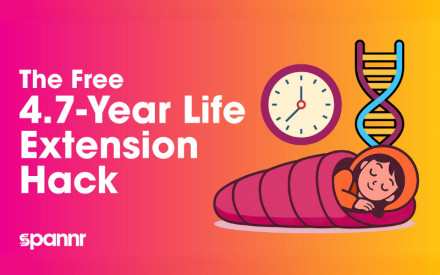Are You Ignoring This Free 4.7-Year Life Extension Hack?

Why sleep might be the most underrated anti-aging hack of all time
Sleep feels boring. At least I think it's boring. It seems passive. While everyone else is biohacking their way to longevity with fancy supplements and cutting-edge protocols, you're just... lying there. But here's the truth bomb that might change everything: sleep is the single most powerful longevity intervention you're probably neglecting. As Matthew Walker, renowned sleep scientist and author of "Why We Sleep," puts it: "The shorter your sleep, the shorter your life span".
The Measurement Trap That's Fooling Everyone
I used to think I was crushing the sleep game. I went to bed at 9pm and got up at 5am—a solid 8 hours, right? Wrong. It wasn't until I started using an Oura ring that I realized the actual amount of sleep I was getting was more like 6.5 hours. I now use a Whoop and it tells mostly the same story. This revelation completely changed how I approached sleep optimization. And those are NOT endorsements of those products, I’m just illustrating a point.
This measurement trap catches almost everyone. Time in bed does not equal actual sleep time. Consumer sleep trackers like the Oura Ring and Whoop have revealed an undeniable truth about how we sleep: most people dramatically overestimate their actual sleep duration. The Oura Ring shows substantial agreement with (big word alert!) polysomnography (the gold standard) for sleep stage detection, with sensitivity rates above 75% for all sleep stages.
Why Sleep Is Your Body's Ultimate Longevity Protocol
Here's what happens when you prioritize real, restorative sleep: your body enters its most powerful repair mode. As Walker notes, "Sleep is the single most effective thing we can do to reset our brain and body health each day". This isn't just recovery—it's active anti-aging at the cellular level.
The Cellular Repair Revolution
During sleep, your body performs critical maintenance that directly impacts longevity. Deep sleep triggers DNA repair mechanisms that fix damage caused by daily stress, UV exposure (which I didn't know about until doing deeper research for this article), and normal metabolic processes. Sleep also enhances protein synthesis and stimulates growth hormone release, both vital for muscle recovery and tissue repair.
The glymphatic system—your brain's waste disposal network—is most active during sleep, clearing out neurotoxins including beta-amyloid, which is associated with Alzheimer's disease. This detoxification process is crucial for maintaining cognitive function and preventing neurodegenerative diseases as you age. (more on all this in an upcoming article about microdosing)
The Inflammation Connection
Chronic sleep deprivation leads to increased inflammatory markers that accelerate aging. Quality sleep helps regulate oxidative stress and strengthens antioxidant defenses, neutralizing harmful free radicals that damage cells. As recent research in my Longevity Loop podcast with sleep expert Devin Burke revealed, this inflammation-sleep connection is one of the most overlooked aspects of healthy aging.
The Longevity Data That Will Wake You Up
A groundbreaking study tracking, and this number is bonkers, over 60,000 people for nearly 8 years found that sleep regularity was a stronger predictor of mortality than sleep duration. Higher sleep regularity was associated with a 20-48% lower risk of all-cause mortality and a 16-39% lower risk of cancer mortality.
Another comprehensive analysis of over 172,000 people identified five key sleep habits that significantly extended lifespan. Men with all five healthy sleep habits had a life expectancy 4.7 years longer at age 30, while women gained 2.7 years. The five habits were:
> Getting 7-8 hours of sleep nightly
> Falling asleep easily most nights
> Staying asleep most nights
> Waking up rested most mornings
> Not using sleep medications (its shocking how many people use sleep medications, and this does NOT include supplements like magnesium)
The biological aging connection is equally compelling. Poor sleep is linked to shorter telomeres—the protective caps on chromosomes that serve as markers of cellular aging. Studies consistently show that people with sleep disturbances, poor sleep quality, and insomnia have shortened leukocyte telomere length compared to good sleepers. So all those NAD+/precursors you might be taking will be in vain unless you get this sleep taken care of!)
The Simple Sleep Optimization Blueprint
You don't need to optimize everything at once. As Walker emphasizes, "Sleep is not an optional lifestyle luxury. Sleep is a non-negotiable biological necessity". These are things I’ve implemented and I’m going to share how you can also start:
Set Your Sleep Foundation
Consistent timing beats everything else. You might think this doesn't matter, but it does, take it seriously. Research shows that wake-up time consistency is more important than bedtime consistency for regulating your circadian rhythm. Set a bedtime alarm—this was a game-changer for me and many others. Schedule it 30-60 minutes before your target bedtime to begin your wind-down routine.
Optimize Your Environment
Temperature is non-negotiable. The ideal sleep temperature is between 65-68°F. Before splurging on expensive cooling mattresses that cost north of $2,000 plus monthly app fees, try turning down your thermostat or investing in a window AC unit—the utility cost increase is minimal compared to those systems, and many ‘sleep systems’ don't last for years anyway.
Create darkness using blackout curtains or a sleep mask, and minimize noise with earplugs or white noise. These simple environmental changes can dramatically improve sleep quality without breaking the bank. A fan often can accomplish cooling and white noise if you don't mind it. I’m fine with a fan, and my wife hates it, so we just turn the AC down at night.
Master the Pre-Sleep Hour
Implement a consistent wind-down routine starting 1-2 hours before bed. Put away electronics—the blue light disrupts melatonin production. Consider activities like reading, gentle stretching, or meditation. Studies show that those who stick to regular bedtime routines fall asleep faster and experience better sleep quality. Even consider getting a pair of the blue light blocking glasses to wear at night… Yes they are dorky, but will help your sleep.
Track What Matters
If you're going to track sleep, focus on consistency over perfection. Sleep regularity—going to bed and waking up at similar times—is more predictive of longevity than hitting exact duration targets. Use devices like the Oura Ring or Whoop to understand your actual sleep patterns, but don't become obsessed with the data, and definitely don't think you need these to get good sleep, you don’t.
The Truth About Sleep and Longevity
As I learned from my recent podcast with Devin Burke, founder of Sleep Science Academy and one of the "Top 25 Health Coaches in America", sleep is often the missing piece in people's longevity protocols. Burke emphasizes that sleep quality trumps quantity—it's not just about hours, but the depth and consistency of your rest.
The research confirms this: adequate sleep supports immune function, with studies showing that people getting less than seven hours nightly are three times more likely to develop colds. Sleep also affects vaccine response—sleep-deprived individuals develop significantly fewer antibodies to vaccines compared to well-rested people.
Your 3-2-1 Sleep Strategy
Here's a simple framework I do and you can also implement immediately:
3 hours before bed: Stop eating large meals and finish exercise
2 hours before bed: Finish work and begin transitioning to relaxation
1 hour before bed: No screens, start your wind-down routine
Set that bedtime alarm, optimize your bedroom temperature, and prioritize consistency over perfection. As Walker reminds us, "Practice does not make perfect. It is practice, followed by a night of sleep, that leads to perfection".
The Bottom Line
Your body won't go where your sleep won't take it. While you're optimizing every other aspect of your health, don't neglect the most powerful longevity intervention available: quality sleep. It's not the reward at the end of your day—it's the launchpad for the next one. One night of quality sleep can do more than five perfect days of diet and supplements. I know with me the 2 biggest game changers where setting a bedtime alarm 1 hour before bed, and going to bed earlier. Going to bed earlier is kinda a ‘duh’ type of thing, and when you realize all you are doing is watching TV or something like that, getting your butt to bed earlier is the best thing you can do (if its feasible of course, but think about if it is, most people I know can do this 100%)
Start with sleep. Let your body show you what it's capable of when it's actually rested. It's about clearing inflammation, resetting your metabolism, and reclaiming energy at the cellular level. The data doesn't lie—those who prioritize sleep don't just live better, they live longer.
Cheers!
About the Author
Sign Up For Our Newsletter
Weekly insights into the future of longevity
